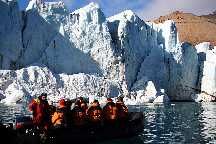Discussion on Global Climate Change
Dale writes:
Craig, you are proceeding from a liberal fallacy that only the uneducated doubt catastrophic climate change. I have BS in meteorology and an MS in environmental engineering, for the last 30 years I have been a practicing environmental professional. I have researched this subject extensively and I am convinced that we have nothing to fear from catastrophic anthropogenic climate change. We have much more to fear from energy shortages brought about by our ridiculous fear of CO2 than we do from any change in climate.
Dale:
Well, cool. If you can enlighten us with respect to your discoveries, we’ll all sleep better tonight. Apparently, your work has landed you among the 2% – 3% of climate scientists who stand in disagreement to the countervailing theory. I, with God as my witness, stand most sincerely ready to hear your position and the science behind it. And obviously, I’m hoping you’re right.


Dale:
Are you 100% certain that we have nothing to fear from climate change?
80%?
What percent?
The amount of risk we are willing to accept for ourselves would be greater than the amount of risk we are willing to impose on others, especially considering that there would be billions of people affected.
Considering the consequences, the certainty would have to exceed 90% to justify taking no action. I do not see how anyone could have that degree of certainty.
Dale,
You should publish a paper and go after a Nobel prize. After all, you seem to have discovered a problem in our understanding of radiation and energy transfer – something that the physics community will be eager to know about.
What’s that? You HAVEN’T debunked all of physics on energy transfer and blackbody radiation behavior? Oh… Then you’re an educated fool who wants to be a stylized contrarion. I’ll move along now.
To All:
There is legitimate speculation as to exactly how much HARM will be caused by global warming vs how much GOOD will be accomplished by the same. IF you live in Canada, for instance, you’ll probably be better off as the world climbs towards 600 ppm… but if you live in Bangladesh your suffering will greatly increase until you die. There are uncertainties and inequalities regarding how global warming will impact any particular region and/or any particular time frame.
What is NOT uncertain, in any manner, is that the Earth must warm as a result of CO2 forcing. This is rooted in Physics and in the chemical properties of specific gasses. There is absolutely no uncertainty in the theory.
While it’s true we will have an energy shortfall in the near term, that’s because we aren’t yet diversified enough in our use of energy sources. We rely too much on fossil fuels that are becoming (a) more expensive to extract and (b) starting to run out, which will cause an unsustainable rise in prices. The era of cheap energy is over for the most part. Yes, we can for the short term switch to natural gas derived from hydraulic fracking, and we can use shale oil, also extracted by using water — while, by the way, severely polluting our natural environment doing both — but we need to switch to making our own energy from the environmental sources available, which include plant, animal, chemical, solar, wind, and tidal, among the many available. In the meantime, the CO2 and methane going into the atmosphere will reduce the total land area available for human use so unless we all want to crowd up together like the Japanese, we’d better stop having multiple babies and start planning how we will live within the constraints of land use and severe climate forces that are in our future. Personally, I’m all in favor of planting more trees.
Therese,
I have spent countless hours trying to find information on how intermittent renewable sources of energy could provide for the energy requirements of prosperous nations. Those asserting that it is practical presumably would be strongly motivated to prove that it would be practical and have not done so, which is why I have concluded that it is not practical and that renewable sources of energy will never be more than a niche source of power. Therefore, I see no alternative but to use nuclear power.
Before migrating to different energy systems and spending untold billions of dollars on them, we should do a careful analysis to be sure that they are practical. If they make power cost several times as much and are not reliable, the public would rebel.
We also have to consider the energy needs of developing countries which will need to multiply their energy use by many times to lift their people out of poverty. They cannot reduce their energy use. If we ignore their needs, it would do little good to reduce our use of fossil fuels to zero tomorrow.
As I see it, and I have seen no proof otherwise, our only choice is nuclear power. Nuclear power is not totally problem free, but there are many possible types of reactors. Unfortunately, the pressurized water uranium reactors that we have mistakenly chosen to use fail by far to be the best choice and therefore create problems that could be avoided by better designs. Even so, they have proven safer than other energy sources, including coal, hydro, etc.
Dale,
You wrote, “Craig, you are proceeding from a liberal fallacy that only the uneducated doubt catastrophic climate change.”
Why did you use the word “liberal?” What does that have to do with the issue? Exactly what points does it clarify?
Instead of using labels which only obfuscate issues, we should stick to hard and objective facts.